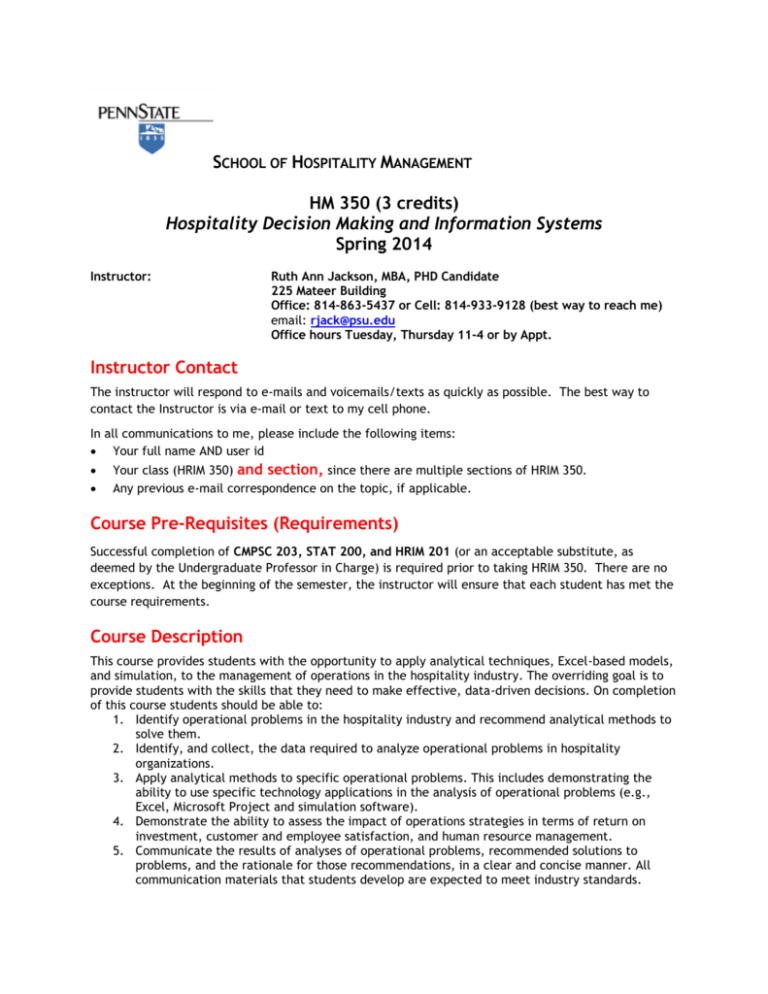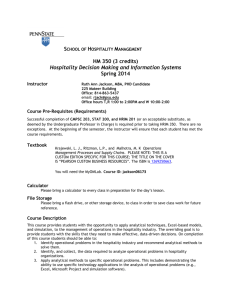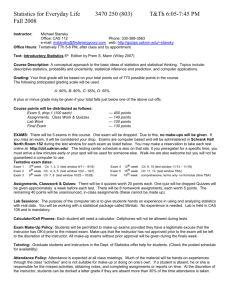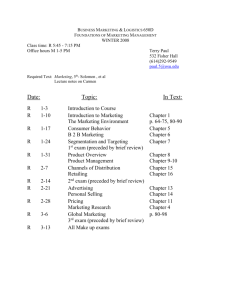HRIM 350 Syllabus - Ruth Ann Jackson e
advertisement

SCHOOL OF HOSPITALITY MANAGEMENT HM 350 (3 credits) Hospitality Decision Making and Information Systems Spring 2014 Instructor: Ruth Ann Jackson, MBA, PHD Candidate 225 Mateer Building Office: 814-863-5437 or Cell: 814-933-9128 (best way to reach me) email: rjack@psu.edu Office hours Tuesday, Thursday 11-4 or by Appt. Instructor Contact The instructor will respond to e-mails and voicemails/texts as quickly as possible. The best way to contact the Instructor is via e-mail or text to my cell phone. In all communications to me, please include the following items: Your full name AND user id Your class (HRIM 350) and section, since there are multiple sections of HRIM 350. Any previous e-mail correspondence on the topic, if applicable. Course Pre-Requisites (Requirements) Successful completion of CMPSC 203, STAT 200, and HRIM 201 (or an acceptable substitute, as deemed by the Undergraduate Professor in Charge) is required prior to taking HRIM 350. There are no exceptions. At the beginning of the semester, the instructor will ensure that each student has met the course requirements. Course Description This course provides students with the opportunity to apply analytical techniques, Excel-based models, and simulation, to the management of operations in the hospitality industry. The overriding goal is to provide students with the skills that they need to make effective, data-driven decisions. On completion of this course students should be able to: 1. Identify operational problems in the hospitality industry and recommend analytical methods to solve them. 2. Identify, and collect, the data required to analyze operational problems in hospitality organizations. 3. Apply analytical methods to specific operational problems. This includes demonstrating the ability to use specific technology applications in the analysis of operational problems (e.g., Excel, Microsoft Project and simulation software). 4. Demonstrate the ability to assess the impact of operations strategies in terms of return on investment, customer and employee satisfaction, and human resource management. 5. Communicate the results of analyses of operational problems, recommended solutions to problems, and the rationale for those recommendations, in a clear and concise manner. All communication materials that students develop are expected to meet industry standards. The main topics addressed in this course include: Productivity Process strategy Project management Decision making Total quality management Process analysis and design Capacity planning Forecasting for operations management Simulation The content of this course is considered fundamental for anyone in hospitality management and, therefore, is required of all School of Hospitality Management majors. Prior to this course, students are required to have taken a course in computer programming with business applications, as well as a course in elementary statistics. This course is a pre-requisite to financial management and marketing courses in the curriculum. Assessment methods may include field reports, homework assignments, reading assignments, case-based group projects and examinations. Relation to other HRIM Courses This course provides a toolkit of qualitative and quantitative information for hospitality decisionmaking. This course provides a basis for advanced work in finance (HRIM 435), marketing (HRIM 442), and strategic planning (HRIM 490), as well as other courses where hospitality students make decisions using various inputs. Required Materials Textbook Krajewski, L. J., Ritzman, L.P., and Malhotra, M. K Operations Management Processes and Supply Chains. PLEASE NOTE: THIS IS A CUSTOM EDITION SPECIFIC FOR THIS COURSE; THE TITLE ON THE COVER IS “PEARSON CUSTOM BUSINESS RESOURCES”. The ISBN is 1269250663. You will need the MyOMLab. Course ID: jackson57539 Calculator Please bring a calculator to every class in preparation for the day’s lesson. File Storage Please bring a flash drive, or other storage device, to class in order to save class work for future reference. Textbook Please bring your textbook to every class. Tentative Course Schedule: WEEK 1 Course Introduction/Syllabus/Schedule/Expectations Intro to MyOMLab Practice Homework MyOMLab and Academic Integrity Module due Jan. 17 Chapter 1 –Using Operations to Compete – Productivity Analysis MyOMLab Homework 1 due Jan. 17 Chapter 2 - Project Management, read pages 35-55 MyOMLab Homework 2 due Jan. 24 EXAM I – CHAPTERS 1-2. Jan 30. In Pollock Testing Center Unit 1 Lab due in ANGEL Drop box Jan 31. Chapter 3 Process Strategy. Read pages 76-95. MyOMLab Homework 3 due Feb 7. WEEK 5 Chapter 4 Process Analysis Read pages 107-130 Feb 11-13 MyOMLab Homework 4 due Feb. 14 Jan 14-16 WEEK 2 Jan 21-23 WEEK 3 Jan 28-30 WEEK 4 Feb 4-6 WEEK 6 Chapter 5 – Statistical Process Control. Read pages 157-174 MyOMLab Homework 5 due Feb 21 Feb 18-20 WEEK 7 Chapter 6 Capacity Planning. Read pages 190 to 206. MyOMLab Homework 6 due Feb. 28 EXAM II – CHAPTERS 4- 6. March 4 in Pollock Testing Center Lab Unit 2 due in ANGEL Drop Box March 6 Feb 25-27 WEEK 8 March 4-6 March 10-14 WEEK 9 SPRING BREAK –NO CLASSES Chapter 7 Constraint Management. Read pages 215-234. MyOMLab Homework 7 due March 21 Chapter 8 – Forecasting. Read pages 248-274. MyOMLab Homework 8 due March 28 March 17-19 WEEK 10 March 25-27 WEEK 11 EXAM III – CHAPTERS 7-9. April 3 in Pollock Testing Center Lab Unit 3 due in ANGEL Drop Box April 4 Ch 9 Decision Making MyOMLab Homework 9 due April 11 Chapter 10 Simulation – Handout Readings Simulation – SIM-QUIK April 15-17 Homework 10 due April 18 WEEK 14 EXAM IV – CHAPTER 10. April 29 in Pollock Testing Center Lab Unit 4 due in ANGEL Drop Box May 1. April 1-3 WEEK 12 April 8-10 WEEK 13 April 22- May 1 WEEK 15 May 5-9 FINAL EXAM WEEK Grading Policy The following assignments will contribute to your final grade. Exam 1 Exam 2 Exam 3 Exam 4 My OM lab Homework Labs #1-4 Academic Integrity Modules TOTAL ALLOCATION TO TOTAL GRADE: 35 points 40 points 40 points 20 points 20 points 40 points 5 points 200 points HRIM 350 Grade Scale A AB+ B BC+ C D F 188 180 174 168 160 151 140 120 0 200 187 179 173 167 159 700 600 119 4.0 3.7 3.3 3.0 2.7 2.3 2.0 1.0 0.0 Note: Students must obtain a grade of “C” or better to successfully complete HRIM 350. Adjustments to Course Grades The Instructor reserves the right to lower course grades for any inappropriate and non-professional behavior. This includes, but is NOT limited to: More than 4 unexcused absences during the semester Absence policy: If you miss class for any reason it is your responsibility to catch up on the missed material on your own. The instructor and teaching assistant are available during office hours for questions but will not go through all of the material for you. Late arrival to class Leaving class early Having your cell phone ring during class Text messaging or other social medial in class. Reading the Collegian or other non-HRIM 350 course materials Performing non- HRIM 350 functions on the computers, such as playing games, IM, checking email, or surfing the Web. Course Assignments Exams: Exams are designed to gauge students’ knowledge, comprehension, and progress in learning the course materials. HRIM 350 exams will consist of multiple choice and short-answer questions, which require computation using various concepts and techniques. Each of the exams will cover the specific topics discussed in the course outline. The exams will be on February 4, March 4, April 8 and April 29 in the Pollock Testing Center. Students will receive email notification to schedule their exam times. Students are expected to follow the rules and policies of operation for the testing center. Absence from an exam counts as a zero (0) towards your final grade. If a student has a Universityrelated excuse or religious conflict, please see the instructor in advance of the exam with appropriate documentation. Please note that “having to work” is NOT a valid excuse. In the case of severe personal illness or accident, the student may qualify to take a make-up exam. The student must complete the following: 1. Phone in the medical excuse to the instructor prior to the exam. If the instructor is not available via phone, leave a message that includes a return phone number where the student can be reached. An e-mail is not adequate in this situation. 2. Supply a physician’s written documentation. Homework Assignments: These assignments are found and submitted on your MyOMLab. All Homework assignments are due on Fridays by 11:00PM. No late assignments will be accepted unless permission is granted in advance by Ms. Jackson in writing. It is expected that ALL homework will be original and completed independently. Unit Labs: Lab assignments should be typed with the appropriate verifiable outputs included. No late assignments will be accepted unless permission is granted by Ms. Jackson in writing. It is expected that ALL lab assignments will be original and completed independently. University Policies All Penn State Policies regarding ethics and honorable behavior apply to this course. Please refer to http://www.psu.edu/ufs/policies for additional details. Student Conduct: The College of HHD’s Academic Integrity Committee states, “All course work by students will be done on an individual basis unless an instructor clearly states that an alternative is acceptable. Any reference material used in the preparation of an assignment, whether quoted or paraphrased, must be explicitly cited. In an examination setting, unless the instructor gives explicit instructions to the contrary, violations of academic integrity shall consist of any attempt to receive assistance from any person or papers or electronic devices, or any attempt to give assistance. Other violations include, but are not limited to, any attempt to gain an unfair advantage in regard to an examination such as tampering with a graded exam or claiming another’s work to be one’s own.” Violations of academic integrity will be handled in accordance with University and College of HHD procedures (see http://www.psu.edu/dept/oue/aappm/G-9.html). A zero tolerance policy is in effect in HRIM 350. Any confirmed case of academic dishonesty earns an “F” in the course, as deemed by the guidelines in policy 49-20. Academic Integrity: Penn State defines academic integrity as “the pursuit of scholarly activity in an open, honest and responsible manner. Academic integrity is a basic guiding principle for all academic activity at The Pennsylvania State University, and all members of the University community are expected to act in accordance with this principle. Consistent with this expectation, the University's Code of Conduct states that all students should act with personal integrity, respect other students' dignity, rights and property, and help create and maintain an environment in which all can succeed through the fruits of their efforts. Academic integrity includes a commitment not to engage in or tolerate acts of falsification, misrepresentation or deception. Such acts of dishonesty violate the fundamental ethical principles of the University community and compromise the worth of work completed by others.” (Senate Policy 4920) Violations of Academic Integrity Policy: Violations of the University’s Academic Integrity Policy include the following: Cheating: using crib sheets of any kind, preprogrammed calculators or cell phones, use of notes during a closed book exam Copying on tests: looking at other students’ exams, copying with a plan with another student, passing notes during exams; exchanging exams with another student Plagiarism: fabricating information or citations; copying from the Internet of submitting the work of others from journals, articles and papers, or books; submitting other students’ papers as one’s own. Any material, regardless of length, that is the work of somebody else and who is not given explicit credit by citation, submitted as one’s own, is plagiarized material. Tampering with work: changing one’s own or another student’s work; tampering with work either as a prank or to sabotage another’s work Acts of aiding and abetting: Facilitating academically dishonest work by others; unauthorized collaboration on work; permitting another to copy from one’s exam; writing a paper for another; inappropriately collaborating on home assignments or exams without permission or when prohibited Unauthorized possession: Buying or stealing of exams or other materials; failing to return exams on file or reviewed in class; selling exams; photocopying exams; any possession of an exam without the instructor’s permission Submitting previous work: Submitting a paper, case study, lab report, or any assignment that had been submitted for credit in a prior class without the knowledge and permission of the instructor Ghosting or misrepresenting: Taking a quiz or exam or performing a class assignment in place of another student; having another student do the same in one’s place; signing in as present in class for another student or having another student do the same in one’s place Altering exams: Changing incorrect answers and seeking favorable grade changes when instructor returns graded exams for in-class review and then collects them; asserting that the instructor made a mistake in grade. Other forms include changing the letter and/or numerical grade on a test. Computer theft: Electronic theft of computer programs or other software, data, images, art, or text belonging to another. There is an online tutorial for students at: http://tlt.its.psu.edu/plagiarism/tutorial/ Special Accommodations: Academically qualified students with disabilities are welcome in this course. If you have a disability-related need for accommodations or modifications in this course, you should contact your instructor and the Office for Disability Services (116 Boucke Building; 863-1807; http://www.lions.psu.edu/ODS).









